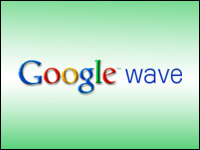
Google announced on Wednesday that it has killed off Google Wave, the sharing and communication Web app it kicked off last year.
Wave “has not seen the user adoption we would have liked,” wrote Urs Holzle, Google’s senior vice president of operations. Google won’t continue developing Wave as a standalone product, but it will maintain the site at least through the end of the year so people can continue developing Wave apps. It will also use the technology in other Google projects, he said.
“They have a saying in the Valley: ‘You have to learn how to fail fast,'” Andrew Eisner, director of community and outreach events at Retrevo, told TechNewsWorld. “You have to wonder what took Google so long to fail.”
There’s speculation that Google will refocus its efforts on other social networking projects such as Google Me and Google Games. However, the Internet giant refused to discuss this.
“We do not comment on rumor and speculation,” Google spokesperson Randall Sarafa told TechNewsWorld.
Aloha, Google Wave
Holzle hinted that Google Wave bit the dust because it was perhaps too advanced.
“Last year at Google I/O, when we launched our developer preview of Google Wave, a Web app for real time communication and collaboration, it set a high bar for what was possible in a Web browser,” he wrote. “Developers in the audience stood and cheered. Some even waved their laptops.”
Apparently the developers later waved goodbye. Why?
“Institutionally, Google doesn’t understand people, it doesn’t know how to generate demand, and it used the ‘throw mud against the wall and see what sticks’ method of product development and release,” Rob Enderle, principal analyst at the Enderle Group, told TechNewsWorld. “Google Wave exemplified all three problems.”
Google couldn’t market the benefits, and the subjective quality of Wave was low, Enderle pointed out.
“This is a wake-up call for Google, and it shows that no company can ever really predict customer satisfaction or buying patterns, even if it has a strong brand name,” Laura DiDio, principal analyst at ITIC, told TechNewsWorld. “Google Wave was very well-hyped, but I think we’re at the point now where a lot of products and companies offer information overload, so maybe people just didn’t think they needed Wave as a collaboration platform.”
Money Isn’t Everything
Perhaps the very fact that Google Wave was free worked against it, DiDio reasoned.
“Where do you have tech service and support for Google Apps, and where do you have documentation?” DiDio asked. “Even if you don’t have to pay for a Wave app, if you were a business or wanted to use it in a meaningful way, you have to get service and support, and you’re going to have to pay for that. Google does charge for Google Enterprise for that reason.”
On the other hand, Microsoft SharePoint, which is a collaboration platform people have to pay for, has been gaining ground, DiDio pointed out.
About 20 percent of respondents to a survey ITIC conducted on SharePoint in October said they used the application across the entire enterprise, while 30 percent used it in one or more departments and 28 percent didn’t use it at all, DiDio said.
In February, another ITIC survey of the same people showed that 26 percent were using SharePoint across the enterprise; 33 percent were using it in one or more departments; and the portion of respondents not using the application fell to 24 percent.
“SharePoint’s been around for several years and has got quite a bit of traction,” DiDio said. Microsoft supports the product and offers upgrades regularly, she added.
Following the Dream
The central parts of the Wave code, as well as the protocols that have driven many of Wave’s innovations, such as drag-and-drop and character-by-character live typing, are already available as open source, Google’s Holzle wrote. This will let customers and partners “continue the innovation we have begun” — which seems to mean Google hopes people will continue to develop Wave apps.
However, developers may not wish to follow the Google Wave dream, if the platform’s history is any indication.
“What Google expects and what will actually happen are likely to be vastly different things,” Enderle opined.
Google will continue to roll Wave technology into other products.
“Many of these features offer real benefits for our users and the wider Web,” Google’s Sarafa said.
Technology from Wave will likely show up in communications and collaboration efforts going forward, as well as product blends like Google Apps, Enderle speculated.
Already Google has incorporated the wave drag-and-drop technology into Gmail. Since April, users with either the Chrome or Firefox 3.6 have been able to drag and drop files from their folders directly into Gmail as attachments instead of having to open a folder, click on the file they want and go through the normal lengthy attachment process. Google will bring this feature to other browsers.
Slapping Facebook
Google has other projects in the social area, including the rumored Google Games and Google Me sevices. It’s not yet clear whether the Internet search giant has other social projects underway.
These all seem to be aimed at tackling Facebook, which Google is now apparently targeting. Google has invested in Zynga, which will form the cornerstone of Google Games. On Thursday, reports surfaced that it has also acquired San Francisco-based virtual communication application developer Slide, whose products are used on social networking sites, for between US$180 and $230 million.
“Google is more obsessed with Facebook now than it is with Apple and Microsoft,” Retrevo’s Eisner pointed out. “They just can’t seem to understand why they haven’t been able to succeed in the social media market, and they keep trying out one thing and another without success.”
Money is likely at the root of Google’s targeting of Facebook. Facebook Chief Operating Officer Cheryl Sandberg announced this week that the social networking giant’s advertisers have increased spending by 10 to 20 times over the past year.
“From a positioning perspective, Google is a natural for social products regardless of type, but from a skills perspective, it falls drastically short,” Enderle said.
“Google’s a very good engineering company that’s good at making people more productive and processes more efficient, but social media is all about fun, and you really have to wonder whether Google has the right ingredients to succeed in the social media market,” Retrevo’s Eisner said. “But Google has the best and brightest, and I wouldn’t count it out for now.”






















































The Google vs. Facebook debate will grow as the services offered evolve (incl. Google Games+Me?). Facebook Like has added to this. Emarketers can see the potential of social plug-ins-a recent survey shows 7/10 have implemented/plan to implement Facebook Like-for more info: http://bit.ly/b8PMyS.